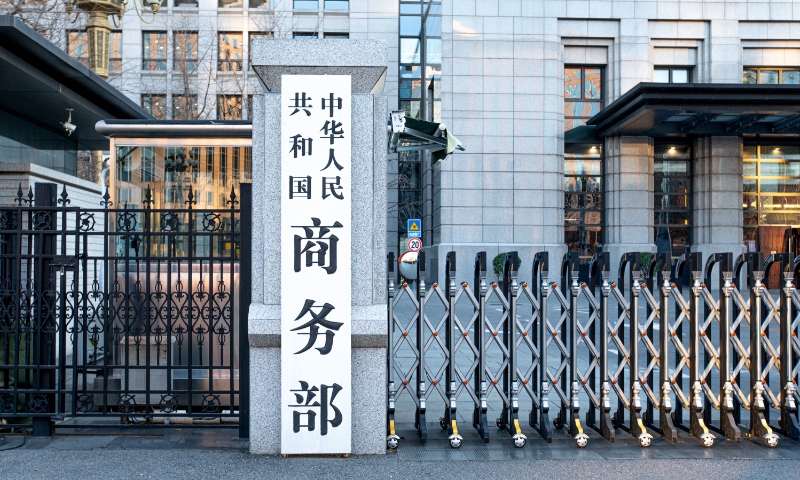Chinese MOFCOM adds 8 Taiwan entities to export control list, ‘precision strike’ against DPP authorities’ attempts to ‘resist reunification by force’: expert

Chinese Ministry of Commerce (MOFCOM) announced on Wednesday that it has added eight entities from China's Taiwan region to the export control list, a move Chinese mainland analysts described as "precision strike" against the military industrial enterprises supporting secessionist authorities on the island and will weaken the attempts of the Democratic Progressive Party (DPP) authorities to "resist reunification by force."
According to a statement, a MOFCOM spokesperson said that the eight entities from the Taiwan island had deliberately collaborated with "Taiwan independence" separatist forces in their attempt to "seek independence through military means.
The decision was made to safeguard national sovereignty, territorial integrity, as well as peace and stability across the Taiwan Straits, and in accordance with Chinese laws and regulations, the statement said.
The export of dual-use items to these eight companies will be prohibited, the spokesperson said, emphasizing that no exporter will be allowed to violate these control measures.
Following the announcement, Chen Binhua, a spokesperson for the State Council Taiwan Affairs Office on Wednesday voiced strong support for the MOFCOM's decision to include eight Taiwan entities in the export control list.
Chen stated that since Lai Ching-te came to power, he has stubbornly adhered to the "Taiwan independence" stance, vigorously propagated separatist fallacies, and attempted to "seek independence by relying on foreign forces" and "seek independence through military means."
Some entities in the Taiwan region have participated in these activities, acting as accomplices. In accordance with relevant laws and regulations, MOFCOM's decision is a necessary measure to safeguard national sovereignty and territorial integrity and maintain peace and stability across the Taiwan Straits, as well as a solemn warning to the "Taiwan independence" separatist forces for their repeated separatist provocations, Chen said.
Seeking "Taiwan independence" is a dead end, and aiding "independence" is an evil path, Chen said. Enterprises, groups and individuals that are willing to be the claws and teeth of "Taiwan independence" separatist forces, participate in splitting the country, and incite crimes of splitting the country will definitely be severely punished in accordance with the law, Chen said.
According to MOFCOM, the eight entities include Aerospace Industrial Development Corp, GEOSAT Aerospace & Technology Inc, "National" Chung-Shan Institute of Science & Technology (NCSIST), JC Technology Inc, CSBC Corporation, Taiwan, Jong Shyn Shipbuilding Co Ltd, Lungteh Shipbuilding Co Ltd and Gong Wei Co Ltd.
The "NCSIST" has close ties with the defense authority on the island and it develops, manufactures, and sells defense technology and weapons including missiles, publicly available information shows.
According to Zheng Jian, a professor at the Taiwan Research Institute at Xiamen University, these eight entities constitute the backbone of military-industrial complex in Taiwan, encompassing critical sectors such as aircraft manufacturing, shipbuilding, drones, software, and information network warfare — priority areas for Taiwan island's military.
Zheng told the Global Times that from raw materials to components and software, many so-called "Taiwan-made" weapons and equipment rely on mainland-sourced elements.
The mainland's sanctions will sever these firms' access to key mainland products and services, disrupting supply chains. As a result, some products may face production halts, while others could be rendered incomplete or lack essential functionalities, Zheng said.
This move by the mainland represents a targeted and precision strike, serving as a clear warning to military-industrial entities that support separatists, the expert stressed.
Li Zhenguang, deputy director at the Institute of Taiwan Studies at Beijing Union University, told the Global Times the mainland's latest move will effectively weaken secessionists' ability and attempts to "resist reunification by force."
He said that the senior personnel overseeing the island's military authority are diehard and highly aggressive secessionists. Therefore, the mainland must undertake targeted preparations to address this.
Peace vs conflicts
The mainland's latest measure coincides with "Han Kuang exercise" held by Taiwan region's military which started on Wednesday.
The exercise focusing on scenarios such as the so-called "response to gray-zone harassment," "joint anti-landing operations," and "resilient defense on the island," with many US weapons making their debut during the exercise. Senior Colonel Jiang Bin, spokesperson for China's Ministry of National Defense, said on Tuesday that the Han Kuang exercise is nothing but a bluff and a self-deceiving trick played by the DPP authorities to hijack Taiwan compatriots on board its "Taiwan Independence" war chariot.
Taiwan regional leader Lai Ching-te's "10 talks on unity" campaign was another secessionist provocation from DPP authorities recently. Taiwan Affairs Office spokesperson Chen Binhua has previously slammed the series speech as a blatant "Taiwan independence manifesto," inciting confrontation across the Straits.
The Chinese mainland, while taking firm action against secessionists in Taiwan region, continues to promote cross-Straits exchanges.
On Wednesday, spokesperson Chen announced the eighth cross-Straits youth development forum will be held from July 10 to 15 in East China's Zhejiang Province. Approximately 1,000 guests and youth representatives from various sectors across the Taiwan Straits are expected to attend, including former chairperson of the Chinese Kuomintang party Hung Hsiu-chu.
Taiwan media also reported that students from the island will join a skills invitational competition in Shanghai with youth from mainland, Hong Kong and Macao, which includes events such as beauty styling, network tech, and robotics.
On July 3, the annual cross-Straits youth summit opened in Beijing, gathering more than 700 individuals from all walks of life and youth representatives on both sides of the Taiwan Straits, according to Xinhua.
While firmly opposing Taiwan secessionists, the mainland is committed to promoting the peaceful development of cross-Straits relations and advancing comprehensive socioeconomic integration across the Straits, according to Li.
Despite the DPP's attempts to obstruct exchanges and stoke tensions, the mainland remains committed to pursuing the prospect of peaceful reunification with the greatest sincerity and utmost effort, Li noted.